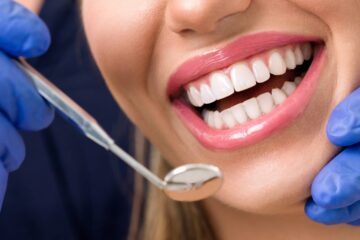Welcome to the world of periodontal care, where the journey from prevention to restoration is as crucial as nurturing a garden from seed to bloom. Just like tending to your plants with care and attention, taking proactive steps to maintain your periodontal health can lead to a flourishing smile that stands the test of time.
In this article, we will delve into the realm of periodontal disease, exploring its causes and effects on oral health. We will emphasise the importance of regular dental visits as a cornerstone for preventing and addressing any potential issues early on. Furthermore, we will explore the various treatment options available for individuals seeking comprehensive periodontal care.
By prioritising your periodontal health, you open doors to long-term benefits that extend beyond just an impeccable smile. From reduced risk of systemic diseases to improved overall well-being, there are numerous reasons why maintaining optimal oral hygiene is essential.
So grab your gardening gloves and join us on this enlightening journey through prevention and restoration in the world of periodontal care. Together, we will equip you with the knowledge and tools needed to cultivate a healthy smile that blossoms with confidence.
Understanding Periodontal Disease
Now, let’s dig deeper into your understanding of periodontal disease and how it affects your oral health.
Periodontal disease is a common condition that affects the gums and supporting structures of the teeth. It is primarily caused by a buildup of plaque, which contains harmful bacteria that can irritate the gums and lead to infection. Poor oral hygiene practices, such as inadequate brushing and flossing, can contribute to the development of periodontal disease.
Recognizing the symptoms of periodontal disease is crucial for early detection and treatment. Common signs include redness, swelling, and tenderness of the gums. You may also experience bleeding while brushing or flossing, persistent bad breath, loose teeth, or changes in your bite. If left untreated, periodontal disease can progress and result in tooth loss.
Understanding these causes and symptoms underscores the importance of regular dental visits. Regular check-ups allow your dentist to assess your oral health, identify any signs of periodontal disease early on, and provide appropriate treatment options. By maintaining good oral hygiene habits at home and visiting your dentist regularly, you can help prevent or manage periodontal disease effectively.
Moving forward into our discussion about the importance of regular dental visits…
Importance of Regular Dental Visits
Regular dental visits are crucial for maintaining optimal oral health. Regular check-ups and dental cleanings play a significant role in preventing periodontal disease and ensuring that any issues are identified and addressed in their early stages.
During these visits, your dentist will thoroughly examine your teeth and gums, looking for signs of inflammation, gum recession, or tooth decay. They may also perform professional dental cleanings to remove plaque and tartar buildup that can’t be removed with regular brushing and flossing alone.
These regular visits not only help prevent periodontal disease but also allow your dentist to monitor your overall oral health. They can identify any potential problems such as cavities or gum disease before they worsen, allowing for prompt treatment and intervention.
By keeping up with regular dental visits, you’re taking an active role in protecting your oral health. You’re giving yourself the best chance at enjoying a healthy smile for years to come. So don’t underestimate the importance of these routine appointments!
Now that we’ve covered the significance of regular dental visits, let’s explore the various treatment options available for periodontal care without delay.
Treatment Options for Periodontal Care
Make sure you don’t overlook the different ways you can address and improve your periodontal health. When it comes to treating periodontal issues, there are both surgical and non-surgical interventions available.
Surgical interventions involve more invasive procedures such as gum grafts, bone grafting, or pocket reduction surgery. These treatments are typically recommended for more advanced cases of periodontitis where significant damage has occurred.
On the other hand, non-surgical interventions are often the first line of defence in managing periodontal disease. These treatments include scaling and root planing, which involves deep cleaning of the teeth and gums to remove plaque and tartar buildup. Additionally, localised antibiotics may be used to target specific areas of infection.
It’s important to note that the treatment options for periodontal care will vary depending on the severity of your condition. Your dentist or periodontist will evaluate your specific needs and recommend the most appropriate course of action.
By addressing your periodontal health through these various treatment options, you can prevent further damage to your gums and bones supporting your teeth. This sets the stage for discussing the long-term benefits of prioritising periodontal health without skipping a beat.
Long-Term Benefits of Prioritising Periodontal Health
By prioritising the health of your gums and bones, you can ensure a solid foundation for your teeth to stand strong and steady throughout the years. Periodontal care isn’t just about treating gum disease; it also focuses on preventing complications and improving your overall health.
When you take proactive steps to maintain healthy gums, you reduce the risk of tooth loss, bone deterioration, and other oral health issues. One of the long-term benefits of prioritising periodontal health is preserving your natural teeth. Gum disease can cause inflammation and infection that lead to tooth loss if it’s left untreated. By practising good oral hygiene habits and seeking regular professional cleanings, you can prevent gum disease from progressing and protect your teeth.
Another advantage is maintaining healthy bones that support your teeth. Periodontitis, an advanced stage of gum disease, can lead to bone loss in the jaw. This can result in loose or unstable teeth over time. By keeping your gums healthy through proper brushing, flossing, and professional care, you can help preserve the integrity of your jawbone.
Prioritising periodontal health not only benefits your mouth but also contributes to better overall health. Research has shown links between gum disease and various systemic conditions such as heart disease, diabetes, respiratory infections, and even certain cancers. By preventing gum disease or managing it effectively if it’s already present, you decrease the risk of developing these potential complications.
In summary, prioritising periodontal care helps prevent complications such as tooth loss and bone deterioration while improving overall health by reducing the risk of systemic conditions related to gum disease.
Transitioning into maintaining oral hygiene for prevention…
Maintaining Oral Hygiene for Prevention
To ensure the long-term health of your teeth and gums, it’s crucial to establish consistent and effective oral hygiene habits. These habits include thorough brushing, flossing, and regular visits to the dentist.
Oral hygiene techniques play a vital role in preventing periodontal disease and maintaining overall oral health.
Brushing your teeth twice a day with a fluoride toothpaste is essential. It helps in removing plaque, the sticky film of bacteria that forms on your teeth. Make sure to use a soft-bristled toothbrush and brush all surfaces of your teeth in gentle circular motions for about two minutes each time. Don’t forget to also clean your tongue, as it can harbour bacteria.
Flossing is equally important as it helps remove plaque and food particles from areas that your toothbrush can’t reach. Be gentle when flossing to avoid damaging your gums.
In addition to regular brushing and flossing, preventive measures like using an antimicrobial mouthwash can further enhance oral hygiene. It reduces bacteria in the mouth. It’s also crucial to maintain a balanced diet low in sugary snacks and beverages, which can contribute to plaque buildup.
Lastly, scheduling regular visits with your dentist for professional cleanings and check-ups allows them to detect any early signs of periodontal disease or other dental issues. They can provide guidance on proper oral hygiene techniques tailored to your specific needs.
By consistently practising these oral hygiene techniques and preventive measures, you can significantly reduce the risk of developing periodontal disease while maintaining optimal oral health for years to come.
Frequently Asked Questions
How do genetics play a role in the development of periodontal disease?
Genetics wield a significant influence on periodontal disease. It’s like an invisible hand shaping your oral health destiny. Research reveals a strong link between genetics and periodontal health, highlighting the importance of understanding this role.
Can periodontal disease be reversed with proper treatment?
Periodontal disease can be reversed with proper treatment. Various options like scaling and root planing, antibiotics, and surgical interventions are effective in combating the disease. Consult a dental professional for personalised advice and treatment.
Are there any natural remedies or home remedies that can help prevent or treat periodontal disease?
You can try natural remedies and home remedies to prevent or treat periodontal disease. These options include oil pulling, using aloe vera gel, gargling with saltwater, and maintaining good oral hygiene habits.
What are the potential side effects or risks associated with different treatment options for periodontal care?
Potential complications and long-term effects of periodontal care treatments may include pain, swelling, bleeding, infection, tooth sensitivity, and gum recession. It’s important to discuss these risks with your dentist or periodontist before undergoing any treatment.
Is it possible to have periodontal disease without experiencing any noticeable symptoms?
Periodontal disease can silently progress without noticeable symptoms, like a stealthy predator stalking its prey. Early detection is crucial to prevent further damage and seek appropriate treatment for optimal periodontal care.
Conclusion
Congratulations on completing this journey through the world of periodontal care! By understanding the ins and outs of periodontal disease and recognizing the importance of regular dental visits, you’ve equipped yourself with valuable knowledge to prioritise your oral health.
Explore treatment options and be proactive in preventing any potential issues. Remember: prevention is always better than restoration. Your smile deserves nothing less than the utmost care and attention.





